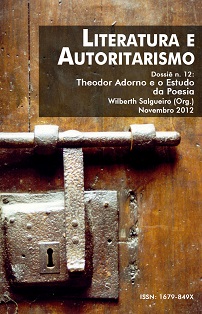Objectification and subjectivity in Murilo Mendes' poetry
DOI:
https://doi.org/10.5902/1679849X72376Keywords:
Modern Brazilian poetry, Historiography, Theodor AdornoAbstract
Murilo Mendes' work has been widely discussed as a natural setting in the context of Modernism, for its portion of Surrealism or Catholicism. From this first mapping of his voice tone, it is interested to point out the interstices of his speech to emphasize the elements that contribute to the delineation of its subjective expression, considering the stylistic traits there present materialize in a particular way in the language used. Therefore, we will take the poem "Coisas" collected in the book Parábola (1952) as an element of exploration to be done through the essays "Signs of punctuation" and “Lecture on poetry and society” of Theodor Adorno. Not before making a brief assessment of how that book was received by some perspective of criticism, notably by Antonio Candido and José Guilherme Merquior.
Downloads
References
ADORNO, Theodor W. Teoria estética. Lisboa: Edições 70, 1993.
ADORNO, Theodor W. Notas de literatura I. São Paulo: Duas Cidades;Ed.34,2003.
CANDIDO, Antonio. Literatura e sociedade. São Paulo: T.A. Queiroz, 2000a.
CANDIDO, Antonio. Na sala de aula. São Paulo: Ática, 2000b.
MENDES, Murilo. Poesia completa e prosa. Rio de Janeiro: Nova Aguilar,1994.
MERQUIOR, José Guilherme. Arte e sociedade em Marcuse, Adorno e Benjamin. Rio de Janeiro: Tempo Brasileiro, 1969.
MERQUIOR, José Guilherme. A astúcia da mimese. Rio de Janeiro: Topbooks,1997.
Downloads
Published
How to Cite
Issue
Section
License
DECLARAÇÃO DE ORIGINALIDADE E EXCLUSIVIDADE E CESSÃO DE DIREITOS AUTORAIS
Declaro que o presente artigo é original e não foi submetido à publicação em qualquer outro periódico nacional ou internacional, quer seja em parte ou na íntegra. Declaro, ainda, que após publicado pela Literatura e Autoritarismo, ele jamais será submetido a outro periódico. Também tenho ciência que a submissão dos originais à Literatura e Autoritarismo implica transferência dos direitos autorais da publicação digital. A não observância desse compromisso submeterá o infrator a sanções e penas previstas na Lei de Proteção de Direitos Autorais (nº 9610, de 19/02/98).






